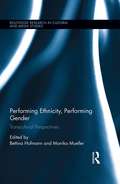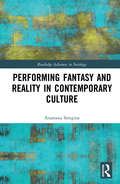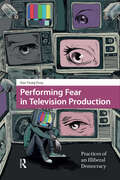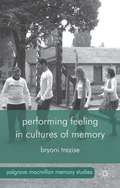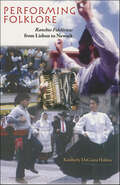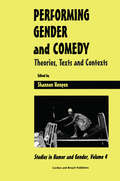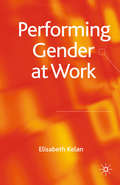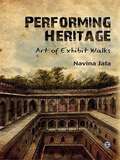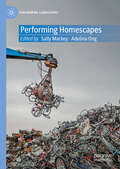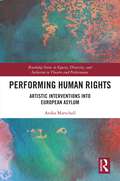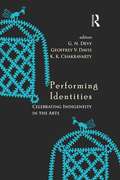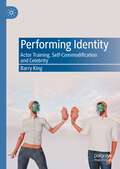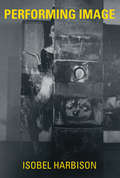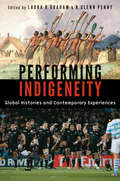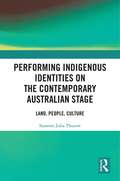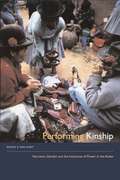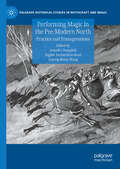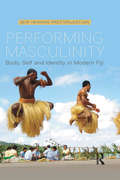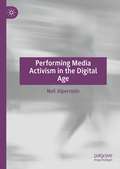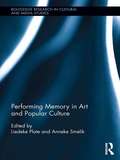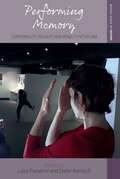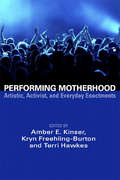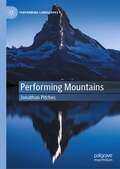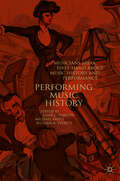- Table View
- List View
Performing Ethnicity, Performing Gender: Transcultural Perspectives (Routledge Research in Cultural and Media Studies)
by Bettina Hofmann Monika MuellerPerformance and performativity are important terms for a theorization of gender and race/ethnicity as constitutive of identity. This collection reflects the ubiquity, diversity, and (historical) locatedness of ethnicity and gender by presenting contributions by an array of international scholars who focus on the representation of these crucial categories of identity across various media, including literature, film, documentary, and (music) video performance. The first section, "Political Agency," stresses instances where the performance of ethnicity/gender ultimately aims at a liberating effect leading to more autonomy. The second section, "Diasporic Belonging," explores the different kinds of negotiations of ethnic performances in multi-ethnic contexts. The third part, "Performances of Ethnicity and Gender" scrutinizes instances of the combined performance of ethnicity and gender in novels, films, and musical performances. The last section "Cross-Ethnic Traffic" contains a number of contributions that are concerned with attempts at crossing over from "one ethnicity into another" by way of performance.
Performing Fantasy and Reality in Contemporary Culture (Routledge Advances in Sociology)
by Anastasia SereginaWe frequently engage with that which we consciously perceive not to be real, yet fantasy, despite its pervasive presence and strong role in everyday life through its connection to identities, communities, desires, and meanings, has yet to be properly defined and researched. This book examines fantasy from a performance theory perspective. Drawing on multidisciplinary literature, it presents ethnographic and art-based research on live action role-playing games to explore fantasy as a bodily and negotiated phenomenon that involves various kinds of engagement with one’s surroundings. Overall, this book is a study of various forms and roles that fantasy can take on as part of contemporary Western culture. The study suggests that fantasy emerges as a different type of interpretation of normalised performance and reality, and can thus provide individuals with the tools to wield agency in everyday life. The book will appeal to scholars of sociology, cultural and media studies, literature and performance studies.
Performing Fear in Television Production: Practices of an Illiberal Democracy (Asian Visual Cultures)
by Siao Yuong FongWhat goes into the ideological sustenance of an illiberal capitalist democracy? While much of the critical discussion of the media in authoritarian contexts focus on state power, the emphasis on strong states tend to perpetuate misnomers about the media as mere tools of the state and sustain myths about their absolute power. Turning to the lived everyday of media producers in Singapore, this book poses a series of questions that explore what it takes to perpetuate authoritarian resilience in the mass media. How, in what terms and through what means, does a politically stable illiberal Asian state like Singapore formulate its dominant imaginary of social order? What are the television production practices that perform and instantiate the social imaginary, and who are the audiences that are conjured and performed in the process? What are the roles played by imagined audiences in sustaining authoritarian resilience in the media? As argued in the book, if audiences function as the central problematic that engenders anxieties and self-policing amongst producers, can the audience become a surrogate for the authoritarian state?
Performing Feeling in Cultures of Memory
by Bryoni TrezisePerforming Feeling in Cultures of Memory brings memory studies into conversation with a focus on feelings as cultural actors. It charts a series of memory sites that range from canonical museums and memorials, to practices enabled by the virtual terrain of Second Life, popular 'trauma TV' programs and radical theatre practice.
Performing Folklore: Ranchos Folclóricas from Lisbon to Newark
by Kimberly DaCosta HoltonThrough the lens of expressive culture, Performing Folklore tracks Portugal's transition from fascism to democracy, and from imperial metropole to EEC member state. Kimberly DaCosta Holton examines the evolution and significance of ranchos folclóricos, groups of amateur musicians and dancers who perform turn-of-the-century popular tradition and have acted as cultural barometers of change throughout 20th-century Portugal. She investigates the role that these folklore groups played in the mid-twentieth-century dictatorship, how they fell out of official favor with the advent of democracy, and why they remain so popular in Portugal's post-authoritarian state, especially in emigrant and diasporic communities. Holton looks at music, dance, costume, repertoire, venue, and social interplay in both local and global contexts. She considers the importance of revivalist folklore in the construction and preservation of national identity in the face of globalization. This book embraces "invented tradition" as process rather than event, presenting an ethnography not only of folkloric revivalism but also of sweeping cultural transformation, promoted alternately by authoritarianism, democracy, emigration, and European unification.
Performing Gender and Comedy: Theories, Texts and Contexts
by Hengen SFirst Published in 1998. Routledge is an imprint of Taylor & Francis, an informa company.
Performing Gender at Work
by Elisabeth KelanProviding aaunique insight into how gender is performed in contemporary high-tech work andaintroducing a creative and novel way of analyzing the fluidity and rigidity of gender at work through discourse analytic methods the author highlights how changes in the world of work interact with changes in gender relations. a"
Performing Heritage
by Navina JafaCentred in academic theory in the area of exhibiting culture, this book seeks to explore the art and politics of cultural representation. While thus far this discussion has been restricted to the closed spaces of museums, exhibitions, cultural festivals and the like, here, this densely interdisciplinary problematic is approached through the unique and increasingly popular medium of Heritage Walks. Focusing on the idea of the living exhibit, the author employs her decades-long career in the field of academic cultural tourism and the performing arts to develop a uniquely critical frame and methodology for engaging with cultures in a dynamic and performative manner. The book argues that heritage walks are necessarily creative and academically invested, and can be an effective medium for rethinking the disciplines of history, sociology and conservation and the challenges they face in contemporary post-colonial India. Through an acutely experiential account, the author bridges the gap between applied and academic theory in the fields of visual anthropology, museology, heritage conservation and cultural studies among others, providing the much needed scholarship in studies of living heritage.
Performing Homescapes (Performing Landscapes)
by Sally Mackey Adelina OngPart of the Performing Landscapes series, Performing Homescapes is an edited collection comprising a contemporary exploration of performing many iterations of landscapes of homes. Authors were invited to respond to a detailed brief with home to be deliberately reconsidered as homescape, represented by landscapes, sites and practices often outside, and occasionally including a conventional home-as-house and intimate dwelling. We wanted a diverse range of geographical sites to be represented and a global offer, encompassing a pluriverse of homescapes. Voices, practices, and epistemologies from the Global South and global majority were important to us, including Indigenous ways of knowing and practicing. This curated collection offers an expanded understanding of the performance of home/scapes as a new intervention into the fields of performance and home scholarship. Performing Homescapes moves beyond spatial meditations within rooms of a house to offer an original critical engagement with the social, political, ecological and cultural landscapes that shape and sustain affects related to the notion of home, unhomeliness and, even, solastalgia. While the impact of the social, political and cultural landscapes on relationships with - and within - the house are implied in most academic literature on forms of performing home, it is foregrounded in the chapters of this edited collection. In addition, certain chapters attend to the more-than-human, human relationships with the Earth as homescape and the co-creation of homescapes within and beyond dwellings.
Performing Human Rights: Artistic Interventions into European Asylum (Routledge Series in Equity, Diversity, and Inclusion in Theatre and Performance)
by Anika MarschallThis book enhances critical perspectives on human rights through the lens of performance studies and argues that contemporary artistic interventions can contribute to our understanding of human rights as a critical and embodied doing. This study is situated in the contemporary discourse of asylum and political art practices. It argues for the need to reimagine human rights as performative and embodied forms of recognition and practical honouring of our shared vulnerability and co-dependency. It contributes to the debate of theatre and migration, by understanding that contemporary asylum issues are complex and context specific, and that they do not only pertain to the refugee, migrant, asylum seeker or stateless person but also to privileged constituencies, institutional structures, forms of organisation and assembly. The book presents a unique mixed-methods approach that focuses equally on performance analyses and on political philosophy, critical legal studies and art history – and thus speaks to a range of politically interested scholars in all four fields.
Performing Identities: Celebrating Indigeneity in the Arts
by GeoffreyV. DavisPerforming Identities brings together essays by scholars, artists and activists engaged in understanding and conserving rapidly disappearing local knowledge forms of indigenous communities across continents. It depicts the imaginative transactions evident in the interface of identity and cultural transformation, raising the issue of cultural rights of these otherwise marginalized communities.
Performing Identity: Actor Training, Self-Commodification and Celebrity
by Barry KingThis book examines how the persistent and deepening casualization and precarity of acting work, coupled with market pressures, has affected the ways in which actors are trained in the US and UK. It reviews the existing state of training, looking at various theories of what the actor does, debates about casting, and the impact of reality television and social media. In the increasing effort to find ways to overcome the precarious labour market for actors and other performers, the traditional emphasis on theatrical character has been replaced by the celebration of the persona – a public image of the performer as a personal brand. As a result, a physiocratic elite, that literally incorporates the collective labour of cultural workers into the star or celebrity body, has formed. This book explores how the star or celebrity’s appearance and comportment are positioned as the rule of nature, formed and abiding outside capitalism as a mode of production. This book will be of interest to those studying theatre studies and performance, contemporary stardom and celebrity and the impact of technology on the formation of identity.
Performing Image (The\mit Press Ser.)
by Isobel HarbisonAn examination of how artists have combined performance and moving image for decades, anticipating our changing relation to images in the internet era.In Performing Image, Isobel Harbison examines how artists have combined performance and moving image in their work since the 1960s, and how this work anticipates our changing relations to images since the advent of smart phones and the spread of online prosumerism. Over this period, artists have used a variety of DIY modes of self-imaging and circulation—from home video to social media—suggesting how and why Western subjects might seek alternative platforms for self-expression and self-representation. In the course of her argument, Harbison offers close analyses of works by such artists as Robert Rauschenberg, Yvonne Rainer, Mark Leckey, Wu Tsang, and Martine Syms.Harbison argues that while we produce images, images also produce us—those that we take and share, those that we see and assimilate through mass media and social media, those that we encounter in museums and galleries. Although all the artists she examines express their relation to images uniquely, they also offer a vantage point on today's productive-consumptive image circuits in which billions of us are caught. This unregulated, all-encompassing image performativity, Harbison writes, puts us to work, for free, in the service of global corporate expansion. Harbison offers a three-part interpretive framework for understanding this new proximity to images as it is negotiated by these artworks, a detailed outline of a set of connected practices—and a declaration of the value of art in an economy of attention and a crisis of representation.
Performing Indigeneity: Global Histories and Contemporary Experiences
by H. Glenn Penny Laura R. GrahamThis engaging collection of essays discusses the complexities of “being” indigenous in public spaces. Laura R. Graham and H. Glenn Penny bring together a set of highly recognized junior and senior scholars, including indigenous scholars, from a variety of fields to provoke critical thinking about the many ways in which individuals and social groups construct and display unique identities around the world. The case studies in Performing Indigeneity underscore the social, historical, and immediate contextual factors at play when indigenous people make decisions about when, how, why, and who can “be” indigenous in public spaces. Performing Indigeneity invites readers to consider how groups and individuals think about performance and display and focuses attention on the ways that public spheres, both indigenous and nonindigenous ones, have received these performances. The essays demonstrate that performance and display are essential to the creation and persistence of indigeneity, while also presenting the conundrum that in many cases “indigeneity” excludes some of the voices or identities that the category purports to represent.
Performing Indigenous Identities on the Contemporary Australian Stage: Land, People, Culture
by Susanne Julia ThurowOver the past 50 years, Indigenous Australian theatre practice has emerged as a dynamic site for the discursive reflection of culture and tradition as well as colonial legacies, leveraging the power of storytelling to create and advocate contemporary fluid conceptions of Indigeneity. Performing Indigenous Identities on the Contemporary Australian Stage offers a window into the history and diversity of this vigorous practice. It introduces the reader to cornerstones of Indigenous Australian cultural frameworks and on this backdrop discusses a wealth of plays in light of their responses to contemporary Australian identity politics. The in-depth readings of two landmark theatre productions, Scott Rankin’s Namatjira (2010) and Wesley Enoch & Anita Heiss’ I Am Eora (2012), trace the artists’ engagement with questions of community consolidation and national reconciliation, carefully considering the implications of their propositions for identity work arising from the translation of traditional ontologies into contemporary orientations. The analyses of the dramatic texts are incrementally enriched by a dense reflection of the production and reception contexts of the plays, providing an expanded framework for the critical consideration of contemporary postcolonial theatre practice that allows for a well-founded appreciation of the strengths yet also pointing to the limitations of current representative approaches on the Australian mainstage. This study will be of great interest to students and scholars of Postcolonial, Literary, Performance and Theatre Studies.
Performing Jane: A Cultural History of Jane Austen Fandom
by Sarah GlossonJane Austen has resonated with readers across generations like no other writer. More than two hundred years after the publication of her most celebrated novel, Pride and Prejudice, people around the world continue to honor “dear Jane.” In Performing Jane, Sarah Glosson explores this vibrant fandom, examining a long history of Austen fans engaging with her work, from wearing hand-sewn bonnets and period-appropriate corsets to creating spirited fanfiction and comical gifsets. Sophisticated and engaging, this study demonstrates that Austen fans of today have a great deal in common with those who loved the English novelist long before the term “fan” came into use. Performing Jane analyzes three ways fans engage with Austen and her work: collecting material related to the writer, whether in physical scrapbooks or on social-media platforms; creating and consuming imitative works, including fanfiction and modernized adaptations such as The Lizzie Bennet Diaries; and making pilgrimages to Steventon, Hampshire, Chawton Cottage, and even to annual meetings of Jane Austen societies. Key to Glosson’s exploration of Austen fans is the notion that all of these activities, whether occurring in private or in public, are fundamentally performative. And in counterbalance to studies that center on fans with a tendency to transform and disrupt the original text, this study provides much-needed understanding of a fandom that predominantly reaffirms Austen’s works. Because Austen’s writing has bridged the realms of both literary and popular culture, this fandom serves as an excellent case study to understand the ways in which we draw distinctions between fandom and other forms of intensive engagement and, more importantly, to appreciate how fluid those distinctions can be. Performing Jane embraces a holistic view of the long history of Austen fandom, relying on archival research, literary and visual analyses, and ethnographic study. This groundbreaking book not only demonstrates the ways in which fan practices, today and in the past, are performative, but also provides fresh perspectives into fandom and contributes to our understanding of the ways readers engage with literature.
Performing Kinship
by Krista E. Van VleetIn the highland region of Sullk'ata, located in the rural Bolivian Andes, habitual activities such as sharing food, work, and stories create a sense of relatedness among people. Through these day-to-day interactions - as well as more unusual events - individuals negotiate the affective bonds and hierarchies of their relationships. In Performing Kinship, Krista E. Van Vleet reveals the ways in which relatedness is evoked, performed, and recast among the women of Sullk'ata. Portraying relationships of camaraderie and conflict, Van Vleet argues that narrative illuminates power relationships, which structure differences among women as well as between women and men. She also contends that in the Andes gender cannot be understood without attention to kinship. Stories such as that of the young woman who migrates to the city to do domestic work and later returns to the highlands voicing a deep ambivalence about the traditional authority of her in-laws provide enlightening examples of the ways in which storytelling enables residents of Sullk'ata to make sense of events and link themselves to one another in a variety of relationships. A vibrant ethnography, Performing Kinship offers a rare glimpse into an compelling world.
Performing Magic in the Pre-Modern North: Practice and Transgressions (Palgrave Historical Studies in Witchcraft and Magic)
by Jennifer Hemphill Ségdae Richardson-Read Solveig Marie WangThis book addresses the varied performances of magic in medieval and early modern Scandinavia. It provides a comprehensive review of the rapidly expanding field of European magic and specifically discusses performances of magic in the pre-modern north. By employing innovating methodologies and covering a wide temporal range, the book offers a uniquely interdisciplinary approach to the study of magic in the pre-modern North. In addition, the minority-driven contributions, written by an international group of dynamic and diverse scholars, complement one another to highlight the many multicultural realities of the pre-modern North.
Performing Masculinity: Body, Self and Identity in Modern Fiji
by Geir PresterudstuenGeir Henning Presterudstuen provides an ethnographic account of howmen in the multicultural urban centres of Fiji perceive, construct andperform masculinities in the context of rapid social change. Theoreticallyinformed by critical feminist theories, postcolonialism, R.W. Connell’s workon masculinities and a Bourdieuan conceptualization of the body, thisbook explores how notions of masculinity, manhood and the male bodyare shaped by the conflicting social forces of Fijian tradition, modernity,commercialization and urbanization.The book provides a timely intervention, from the grassroots level in theglobal south, into an ongoing discourse about men and masculinities thathas long been dominated by voices from Europe and the US. Combiningclassic ethnography with innovative social analysis, Presterudstuen’sbook is suitable for students and academics with an interest in genderand social change, and for scholars across a variety of disciplinesincluding anthropology, gender studies, sociology, pacific studies andinternational development.
Performing Media Activism in the Digital Age
by Neil AlpersteinPerforming Media Activism in the Digital Age breaks new ground by conceptualizing activism as a performance extending beyond public space and the moment of public gatherings to consider the more extended view of social or political movements as mediated social connections. The book utilizes primary data extracted from social media platforms by applying a social network analysis (SNA) approach to the people, organizations, and media that are trying to advance their particular agendas, with an eye toward a better understanding of the ways in which social movements operate in a networked society. The goal of social network analysis is to identify social structures within a movement such as communities or clusters and it seeks to locate influence within those structures.Social network analysis as applied to media activism represents an interdisciplinary field that encompasses social psychology, sociology, as well as graph theory, which should suggest this book will be of interest to scholars and students in these and related fields. In the digital age, social network analysis represents a paradigm shift as analytical and data visualization tools can be applied in an interdisciplinary manner. By combining data science and sociology or cultural anthropology, one has the means to visualize networks of individuals and organizations engaged in a social movement, to see how movements are organized (structured) into communities, clusters, and niches, and to visualize power structures within social movements to see who is influencing a network over extended periods of time.
Performing Memory in Art and Popular Culture (Routledge Research in Cultural and Media Studies)
by Liedeke Plate Anneke SmelikThis volume pursues a new line of research in cultural memory studies by understanding memory as a performative act in art and popular culture. The authors take their cue from the observation that art and popular culture enact memory and generate processes of memory. They do memory, and in this doing of memory new questions about the cultural dimensions of memory arise: How do art objects and artistic practices perform the past in the present? What is their relationship to the archive? Does the past speak in the performed past (or do we speak to it)? To what purpose do objects "recall"? And for whom do they recollect? Here authors combine a methodological focus on memory as performance with a theoretical focus on art and popular culture as practices of remembrance. The essays in the book thus analyze what is at stake in the complex processes of remembering and forgetting, of recollecting and disremembering, of amnesia and anamnesis, that make up cultural memory.
Performing Memory: Corporeality, Visuality, and Mobility after 1968 (Making Sense of History #47)
by Luisa Passerini Dieter ReinischThrough a post-1968 perspective on the past 50 years, Performing Memory brings together case studies on new developments in the relationship between politics and visual representation—including the histories of dance, theatre, political performance and cinema and investigates how they relate to the interlinked concepts of visuality, corporeality and mobility. Using a collective transdisciplinary attitude from within historical disciplines, and looking across to artistic fields, this volume demonstrates that memory is not merely a recollection of experience but an interactive process, in which the body, mobile and constrained, is both a point of departure and reference.
Performing Motherhood; Artistic, Activist and Everyday Enactments: Artistic, Activist, And Everyday Enactments
by Amber E JinserPerforming Motherhood explores relationships between performativity and the maternal. Highlighting mothers’ lived experiences, this collection examines mothers’ creativity and agency as they perform in everyday life: in mothering, in activism, and in the arts. Chapters contain theoretically grounded works that emerge from multiple disciplines and cross-disciplines and include first-person narratives, empirical studies, artistic representations, and performance pieces. This book focuses on motherwork, maternal agency, mothers’ multiple identities and marginalized maternal voices, and explores how these are performatively constituted, negotiated and affirmed.
Performing Mountains (Performing Landscapes)
by Jonathan PitchesLaunching the landmark Performing Landscapes series, Performing Mountains brings together for the first time Mountain Studies and Performance Studies in order to examine an international selection of dramatic responses to mountain landscapes. Moving between different registers of writing, the book offers a critical assessment of how the cultural turn in landscape studies interacts with the practices of environmental theatre and performance. Conceived in three main parts, it begins by unpicking the layers of disciplinary complexity in both fields, before surveying the rich history and practice of rituals, playtexts and site specific works inspired by mountains. The last section moves to a unique analysis of mountains themselves using key concepts from performance: training, scenography, acting and spectatorship. Threaded throughout is a very personal tale of mountain research, offering a handrail or alternative guide through the book.
Performing Music History: Musicians Speak First-Hand about Music History and Performance
by John C. Tibbetts William A. Everett Michael SafflePerforming Music History offers a unique perspective on music history and performance through a series of conversations with women and men intimately associated with music performance, history, and practice: the musicians themselves. Fifty-five celebrated artists—singers, pianists, violinists, cellists, flutists, horn players, oboists, composers, conductors, and jazz greats—provide interviews that encompass most of Western music history, from the Middle Ages to contemporary classical music, avant-garde innovations, and Broadway musicals. The book covers music history through lenses that include “authentic” performance, original instrumentation, and social context. Moreover, the musicians interviewed all bring to bear upon their respective subjects three outstanding qualities: 1) their high esteem in the music world as immediately recognizable names among musicians and public alike; 2) their energy and devotion to scholarship and the recovery of endangered musical heritages; and 3) their considerable skills, media savvy, and showmanship as communicators. Introductory essays to each chapter provide brief synopses of historical eras and topics. Combining careful scholarship and lively conversation, Performing Music History explores historical contexts for a host of fascinating issues.
